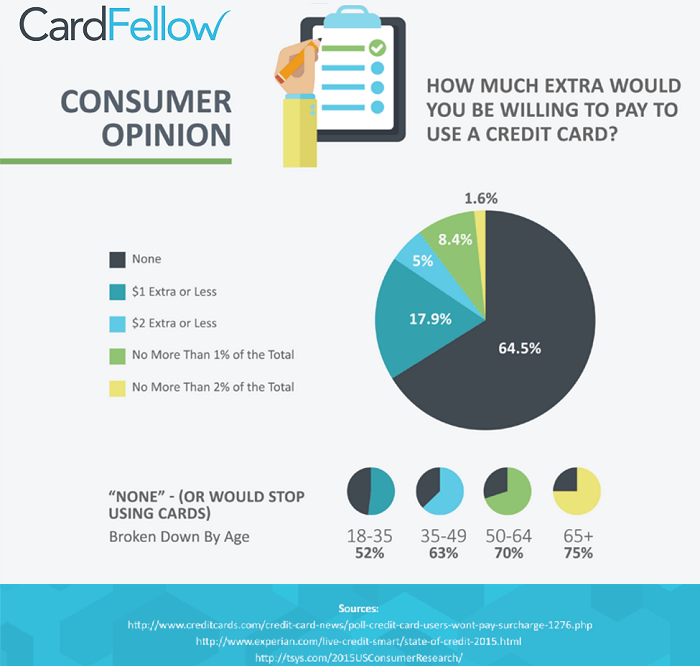What Is Zero-Fee Processing?
Zero-fee processing or “no cost” processing is a processing solution where credit card processing fees are passed to your customers automatically. Instead of your business paying the processing costs, your customers will pay those fees. Passing your processing costs to customers is known as surcharging credit cards, and is already an option you can choose regardless of your credit card processor. In the United States, surcharging is permissible in all but a few states as long as certain requirements are met. While no-fee credit card processing is available with traditional processors, some companies are trying to create a business around offering "free" or "no-cost" processing, meaning that the processor will handle the setup of surcharging for you. This type of processor arrangement is primarily what I’ll focus on in this article.Is there really no cost to me?
Not exactly. With zero-cost processing, the majority of the costs will be covered by your customers, but there may still be costs to you, including monthly fees, PCI compliance fees, and more. For example, one company - Blue Yonder - charges a $65 monthly fee for processing. With some processors, you can choose to bundle the additional fees into the customer surcharge. Additionally, surcharges can only be applied to credit cards. If your customer chooses to pay with a debit card, you’ll still incur the costs of processing that transaction, even if the card is "run as credit." A debit card is always considered a debit card for processing purposes, and so it will incur debit card costs. (Contrary to popular belief, processing debit cards isn't free.) Lastly, you may have equipment charges. Some zero fee processors offer the option to lease credit card machines, which I strongly suggest not doing. Leasing will add monthly charges that far exceed the costs of purchasing a terminal outright.Zero Fee Processing Considerations
Credit card processing isn’t cheap, and the idea of free processing is appealing. But there are some potential drawbacks to zero fee processing or surcharging. Since the costs are borne by your customers, you should ask yourself:- Are competitors surcharging? If not, how will you attract and keep customers when they’ll be expected to pay 2-3% more at your business? Will your competitors be able to use your surcharge against you?
- Can your goods or services be easily obtained elsewhere? The internet makes it easy for customers to find somewhere else to make their purchases. Can customers purchase the same things you offer with little or no inconvenience? For brick and mortar, remember that major retailers like Walmart and Target don’t surcharge.
- Are your transactions high dollar value? Surcharges apply as a percentage of the total transaction amount. A customer that isn't concerned about an additional 3% fee on a $20 meal may care a lot more when they're seeing an additional 3% fee on a $500 TV or $1,000 computer.
- Is your target market strongly against surcharging? As shown in this infographic, 64.5% of people surveyed say they would stop using cards if surcharges are applied.
 Additionally, according to a January 2025 press release about the the J.D. Power 2025 U.S. Merchant Services Satisfaction Study, 41% of credit card users say they have decided not to use a card due to a surcharge. However, it's unclear if those consumers instead chose to pay with cash / check or if they abandoned the purchase.
Since surcharges can only be applied to credit card transactions, it make customers consider using their debit card, resulting in lower costs than credit card transactions, but not eliminating your fees. It could have a bigger effect: customers may choose to go elsewhere. Some customers use their credit cards to get rewards, while others don’t carry cash. In those instances, customers may choose not to shop at your business rather than pay what they see as a penalty for using a credit card.
Additionally, according to a January 2025 press release about the the J.D. Power 2025 U.S. Merchant Services Satisfaction Study, 41% of credit card users say they have decided not to use a card due to a surcharge. However, it's unclear if those consumers instead chose to pay with cash / check or if they abandoned the purchase.
Since surcharges can only be applied to credit card transactions, it make customers consider using their debit card, resulting in lower costs than credit card transactions, but not eliminating your fees. It could have a bigger effect: customers may choose to go elsewhere. Some customers use their credit cards to get rewards, while others don’t carry cash. In those instances, customers may choose not to shop at your business rather than pay what they see as a penalty for using a credit card.




